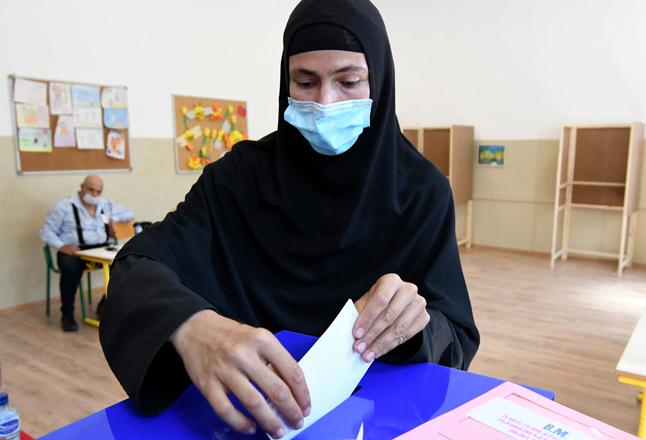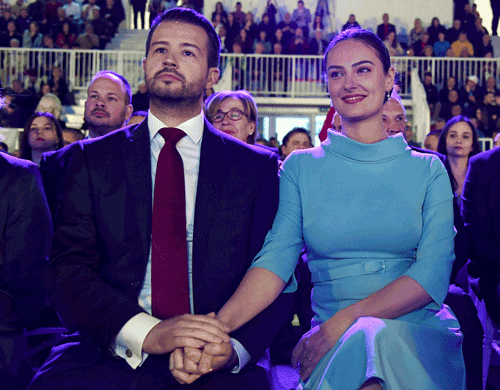You are here
Montenegro president ready to give mandate to opposition
By AFP - Sep 02,2020 - Last updated at Sep 02,2020

Opposition supporters celebrate on the streets after the general elections in Podgorica, Montenegro, on Monday (AFP photo)
PODGORICA — Montenegro’s president has said he will give a mandate to the opposition if they unite to form a majority post-election, in what would be the first ever change of power through the ballot box.
The ruling Democratic Party of Socialists (DPS) headed by President Milo Djukanovic, who has led the Adriatic nation for more than three decades, suffered its worst setback in history in a parliamentary election on Sunday that gave a narrow advantage to three opposition coalitions.
“We had a warning on Sunday,” the 58-year-old president, one of Europe’s longest serving leaders, said on Tuesday evening in an interview with the regional channel Newsmax Adria.
He vowed to “respect” the rules and give whoever has at least 41 seats in the 81-member assembly “the opportunity to form the new government”.
Djukanovic himself does not face reelection until 2023.
While pro-democracy voices have celebrated the prospect of a change to his strongman-style rule, others have raised concern about the nationalistic pro-Serb forces that would be part of a new government.
Since the election, supporters of the pro-Serb camp — the biggest of three opposition coalitions — have gathered in the thousands to celebrate, waving Serbian flags and chanting nationalistic songs.
Members of Montenegro’s Muslim minority have reported attacks, including vandalism of buildings owned by the Islamic Community, a religious body representing Muslims, in northern Pljevlja.
“This madness must be stopped,” the town’s chief imam, Samir Kadribasic, wrote in a Facebook post showing broken windows and a message left by the perpetrators: “Pljevlja will be Srebrenica,” a reference to the genocide of Muslims by Bosnian Serb forces during Yugoslavia’s 1990s wars.
Two Muslim men in the town were also physically attacked, the Islamic Community said.
Violence condemned
The three opposition coalitions are a motley mix, composed of the large right-wing pro-Serb alliance, followed by a more centrist camp and a smaller liberal bloc.
But they have pledged to join forces and oust DPS.
While the official seat allocations have not yet been announced, projections from election monitors put the opposition camps in line for a combined 41.
The pro-Serb opposition leader, as well as the powerful Serbian Orthodox church that backs them, have condemned the recent violence but suggested it was “provoked” by the government.
Djukanovic, meanwhile, has blasted the incidents as a revival of the “nationalism of of the 1990s”, and accused Belgrade of stirring up bigotry ahead of the poll.
While Montenegro declared independence from Serbia 14 years ago, around a third of the 620,000-strong population identify as Serb, some of whom have scorned Djukanovic’s state-building project to cement a separate Montenegrin identity.
The pro-Serb forces were boosted this year by a row between Djukanovic and the Belgrade-based Serbian Orthodox Church (SPC), which is still Montenegro’s main faith.
The conflict erupted over a law that could turn hundreds of SPC churches into state property.
Its passage in late 2019 sent tens of thousands into the streets, in processions led by priests who accused the government of trying to steal their holy relics and erase Serb heritage.
Serbian media also fanned the flames, alleging before the election that Djukanovic would carry out a “pogrom against Serbs”.
Djukanovic accused Belgrade of directing the campaign to “revitalise the policy of Greater Serbian nationalism”, a reference to an ultra-nationalist dream to unite all parts of the Balkans with Serb communities.
Related Articles
PODGORICA, Montenegro — Montenegrins went to the polls on Sunday in an election testing the three-decade domination of a pro-West party whic
PODGORICA, Montenegro — Montenegro is girding for a closely watched presidential run-off on Sunday, when a young upstart could upend the Bal
POTOCARI, Bosnia and Herzegovina — Serbia's prime minister was forced to flee a ceremony held to mark 20 years since the Srebrenica massacre














